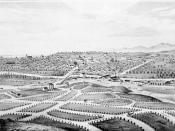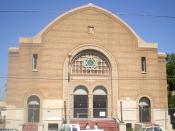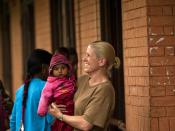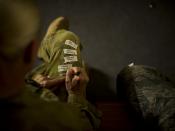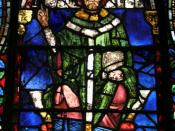The Catholic Worker movement is composed of several Catholic communities founded by Dorothy Day and Peter Maurin in the 1930ÃÂs during the Great Depression. The Catholic Worker aims to live its life by the way of the Gospel of Jesus, more specifically, the verse Matthew 25. Catholic Workers live out the mission of the Gospel by actions such as helping out the poor, campaigning for nonviolence, and promoting social justice. Each Catholic Worker house has a different mission, and their daily life is suited to the issues surrounding their local region. One of the most prominent Catholic Worker communities is the Los Angeles Catholic Worker. The LACW embodies several important characteristics that Dorothy Day and Peter Maurin personified: social activism, anarchism, pacifism, and service along with the tenets of Catholicism. Los Angeles Catholic Worker puts into practice the Works of Mercy, the Spiritual Works of Mercy, and the Works of peace in the tradition of the original Catholic Worker started by Dorothy and Peter.
Chris and Dan Delaney, a former nun, and a former priest, founded the Los Angeles Catholic Worker in 1970. They left their order to get married, and to found the Los Angeles Catholic Worker. The Los Angeles Catholic Workers consists of two locations, the Ammon Hennacy House of Hospitality, and the Hospitality Kitchen, notoriously known as the ÃÂHippie Kitchen.ÃÂ The LACW Hippie Kitchen is located at the corner of 6th Street and Gladys Avenue in the central city ghetto of Los Angeles, known as Skid Row. The House of Hospitality is about a fifteen-minute drive north of the Hippie Kitchen, on Brittania Avenue in the Latino neighborhood of Boyle Heights. The Hospitality Kitchen and the House of Hospitality both serve different functions, but are united in their serving the Works of Mercy.
The two Los Angeles Catholic Worker locations are both excellent examples of fulfilling Jesus ChristÃÂs work on Earth. The first location, the Hippie Kitchen serves a hot meal to the poor in Skid Row on Tuesdays, Thursdays, and Saturdays. In addition to the soup kitchen, the LACW has a food van which serves a breakfast of oatmeal, boiled eggs, and coffee. Over the course of the day, the Hippie Kitchen serves about one to two thousand meals to the poor. The Hippie Kitchen also serves the poor by handing out blankets, and toiletry products such as lotion, soap, or tissues. The Hippie Kitchen also has a clinic staffed by a volunteer nurse that hands out over the counter medicine to those in need. Even more helpful, there is a free dental clinic every Friday, staffed by a local dentist. At the dental clinic, the LACW hands out toothbrushes and toothpaste to the poor, as well. One of the most interesting and notorious handouts is the shopping carts that the LACW bought for the homeless to use for their belongings, and as transportation. The LA Police Department is authorized to confiscate shopping carts stolen from retailers, and this includes confiscating a homeless personÃÂs belongings as well. Because of this, LACW decided to purchase shopping carts for the homeless, and therefore, since the carts belonged to the LACW, any found carts would be returned to them. With the handing out of the shopping carts, medical care, and food for free, the LACW Hospitality Kitchen lives out the Works of Mercy in the spirit of the Catholic Worker Tradition.
The Ammon Hennacy House of Hospitality is another aspect of the Los Angeles Catholic WorkerÃÂs commitment to the Works of Mercy. Joan and Tony Trafecanty purchased the House of Hospitality for the LACW in 1977. The Trafecanty still live adjacent to the LA Catholic Worker house, as well. The House of Hospitalty itself is a one hundred year old Victorian style house in the neighborhood of Boyle Heights in Los Angeles. The house has fourteen bedrooms and at any time it houses eight to ten homeless guests. In addition to this, there is a two bedroom apartment above the garage of the house and the LACW temporarily lets single women with children stay there as temporary housing. The guests are normally homeless people with mental health issues, or a permanent physical disability. On occasion, the House of Hospitality will take in guests on a short-term situation if needed. Even more of a trying situation is when the LACW opens its home to those that are dying. This has been more recent; having taken place in the last ten years. The LACW describes hospice care as ÃÂboth frightening and stressful, [hospice care] has also given us many powerful and grace-filled experiences. When we walk with the dying, we walk with Christ to the cross and through this experience our faith is tested and strengthened.ÃÂ The House of Hospitality at this time has nine community members and two visitors who all work full time in return for room and board and a fifteen-dollar a week living stipend. These community membersÃÂ job is to work at the kitchen and the house of hospitality. In return, the LACW brings them a sense of community and the ÃÂsatisfaction of knowing that are trying to live life the way Christ would.ÃÂ Several of the community members have also been married, and have had kids that have been brought up in the community. To add to the sense of community, the LACW also has a six-week internship program that allows any interested adult to join the community from mid-June through early August. This gives anyone the opportunity to ÃÂlive and work with a gospel-based community, to discern oneÃÂs vocation, or just simply to deepen oneÃÂs social justice experience on a first-hand basis.ÃÂ Along with the interns, the community also routinely welcomes interested adults to stay at the house for a couple of weeks throughout the year. The LA Catholic Worker is very focused on building a community in the House. Jeff Dietrich, arguably the best known of the LA Catholic Workers says that building the community is similar to making a good a marriageÃÂit is rewarding but it takes a lot of work. The purpose of the House of Hospitality community is to have a group of people live together in peace, harmony, and cooperation with each other, equally striving to help our brothers in need. The sense of community is the most important thing because Dorothy Day and the LACW believe that the power of community will heal the wounds of our era.
Another central idea to the Catholic Worker community is the Spiritual Works of Mercy. The LA Catholic Worker practices this as well. Every Wednesday night at six in the evening, at the Ammon Hennacy House of Hospitality, the LACW hosts a liturgy followed by a potluck dinner. Prayer is a very important part of the LACW tradition. When the day starts for a Catholic Worker in the community, they are up early to prepare meals for the Hippie Kitchen. Before meal preparation it is tradition to say the prayer of St. Francis, and then another short prayer before serving the meals. After the meals have been served, the members of the community participate in an agape service, breaking bread and reading the Bible. Along with prayer, there is some of Peter MaurinÃÂs ÃÂclarification of thought.ÃÂ Every Tuesday, the community holds a business meeting in which they talk about tasks for the upcoming week, and about donations received for the community. Also, every Friday afternoon, the Hennacy House of Hospitality hosts what they call a ÃÂculture critique.ÃÂ The LACW shows films, or invite guest speakers to come in and talk, or older members will share stories about the LACW happenings back in the day. There is also a Bible study with the ÃÂculture critique.ÃÂ This is like ÃÂclarification of thoughtÃÂ because these discussions encourage dialogue between members of the community, and gives others the opportunity to learn from others. Unlike Peter MaurinÃÂs ideal Catholic Worker, the LACW does not involve itself in much ÃÂback to the landÃÂ practices. Given the area that the LA Catholic Worker is in (downtown LA), there is not much room for any farming, or the money to buy any significant portion of land on which to farm. Still, the LACW Hippie KitchenÃÂs dining area is an outdoor patio with trees, flowers, fountains, goldfish, and benches on which to sit. The outdoor dining facility is a place that serves to ÃÂhumanize an otherwise inhuman situation, bringing grace and peace to both server and the served.ÃÂ In the backyard of the Hennacy House, some people have grown food in vegetable patches, but it is not a ritualistic practice. Some people have expressed interest in doing more about going ÃÂback to the land,ÃÂ but the LACW does not have the resources to make this practice a reality.
Lastly, the Los Angeles Catholic Worker puts into practice the Works of Peace. For example, LACW practices tax resistance. The LACW does not pay any form of income tax, nor does it associate itself with the government by filing as a 501(c)(3) non-profit organization. The LACW is still running to this day solely because of private donations to the community. Because of their anti-government stance, these donations are also not tax deductible. The reason for this is because by being a government-recognized non-profit organization, this would involve a corporate hierarchy in the organization, as well as acknowledgement from the government. As an anarchistic community, the LACW does not want to portray any other image and show that they agree with governmental corporate structure, or the government in general.
The LACW stages many protests against what they feel is unjust. One of the most notorious protests was against the new cathedral being built in the heart of Los Angeles, by the archdiocese of LA. Cardinal Roger Mahony decided to build the church in one of the poorest parts of LA, and this angered the LACW. Jeff Dietrich and several of the LACW community members scaled the wall of the cathedral, sat on top of the bell tower, and unraveled a banner that read ÃÂWe reclaim the church for the poor.ÃÂ In addition to this, the LACW protests the death penalty and remains committed to pacifism and nonviolence. The LACW protests on the corner of Spring and Temple Streets on the fourth Monday of every month from four to five in the afternoon. The LACW along with the California People of Faith read the names of all those who have been executed by the death penalty since its reinstatement. In its commitment to non-violence, the LACW also holds two regular anti-war vigils. The first is held every day, Monday through Saturday, except for Wednesday on the corner of Alameda and Arcadia streets. The reason for this location is because it is close to the MDC Federal Prison and Union Station. On the Wednesdays that they are not protesting on Alameda and Arcadia, they are protesting the Iraq War two blocks south on Temple and Alameda. At eight in the morning, the LACW gathers here and goes around the Federal Building and reads the names of those who have been reported killed in Iraq in the previous week. Similar to the protests at the Federal Building in LA, there have been several staged protests at military bases, such as Vandenberg Air Force Base in Lompoc, California. One of the protests involved advocating against the renewed development of the missile program known as ÃÂStar Wars.ÃÂ Over the course of the LA Catholic Worker, the members of the community have been arrested for their demonstrations and activism. Their civil disobedience is key to inspiring change in how the U.S. Government performs. Jeff Dietrich is not afraid of going to jail for his protests; in fact, he has been to jail over thirty times. He is quoted saying that ÃÂgoing to jail is part of the witness.ÃÂ In order to improve the lives of those in the community, the LACW has increasingly become more involved in protesting injustices not only in the LA area, but with government abuses committed worldwide. The LACWÃÂs central commitment to protesting injustice is to strive to protect and restore human rights: the rights of the poor here domestically and the rights of those around the world that will be violated by the U.S. GovernmentÃÂs military actions.
Overall, the Los Angeles Catholic Worker is well known for its social justice activism. In regards to the Works of Mercy, the Spiritual Works of Mercy, and the Works of Peace, the LA Catholic Worker is involved with them all. Both of the LACW community members interviewed had said that they were proud of the way that LACW fights for what it believes in. The Bible enumerates the Works of Mercy in the Parable of the Sheep and the Goats in Matthew 25, and the LACW tries hard to live out the word in our present day, capitalistic society. The LACW has been steadily running and a part of the LA community since 1970, thanks to the works of its community members and volunteers, as well as the support and donations given by the local community. At the end of the interview, the last topic of discussion was ÃÂhow would Dorothy Day feel about the way that the LA Catholic Worker operates today?ÃÂ The best way to describe the LACW answer is from a quote by Jeff Dietrich: ÃÂTo live the life of the Gospel, of witness, you must live an alternative lifeÃÂ .The community and the service are all of a piece. WeÃÂre about justice ÃÂ restoring to the poor the money that has been stolen from them. I feel good about what I do. If I die tomorrow I feel my life will have been worthwhile.ÃÂ Taking into account everything about the LACW, I am sure that Dorothy Day would be proud.
Los Angeles Catholic Worker - www.lacatholicworker.org

